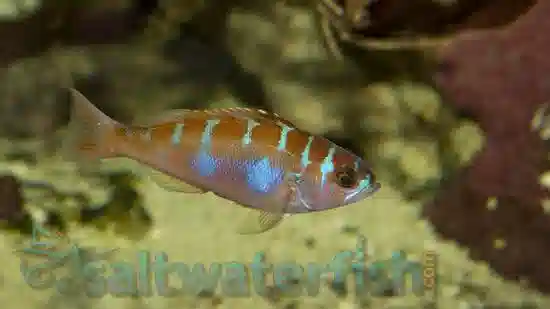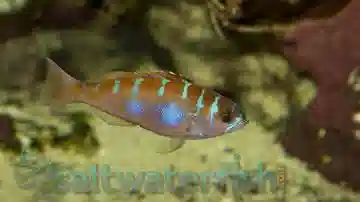Chalk Basslet
Serranus tortugarum
(4 Reviews)

Chalk Basslet
Serranus tortugarum
(4 Reviews)
{{ item.name }}
Size: {{ item.extra_field_3 }}
${{ getFormattedPrice(item.saleprice) }} ${{ getFormattedPrice(item.price) }}
To join the waiting list, click here
Free Shipping
With
$199.00
or more in Marine Life.
More details...
Chalk Basslet Care Facts
| Care Level: | Easy |
|---|---|
| Temperament: | Peaceful |
| Diet: | Carnivore |
| Reef Safe: | Yes |
| Minimum Tank Size: | 30 gallons |
| Max Size: | 4 inches |
Chalk Basslet (Serranus tortugarum): Elevate Your Aquarium with Color and Peace
Welcome to saltwater marine aquariums, where the Chalk Basslet (Serranus tortugarum) takes center stage. This modest-sized, captivating fish species is a fantastic addition to your aquarium, known for its vibrant coloration and peaceful disposition. This comprehensive product description will delve into all aspects of keeping Chalk Basslets, ensuring a rewarding and enjoyable marine aquarium experience.
Habitat: Thriving in the Warm Waters of the Western Atlantic Ocean
Chalk Basslets hail from the warm, tropical waters of the Western Atlantic Ocean. They are commonly found dwelling amidst rocky crevices and coral reefs, typically at depths ranging from 10 to 120 feet. These rocky shelters serve as the Chalk Basslet's refuge and hunting grounds.
Reef Compatibility: Perfect Harmony with Coral Reefs
One of the many attractive features of the Chalk Basslet is its reef-safe nature. They coexist harmoniously with coral reefs and are not known to harm or disturb the coral polyps. This makes them an ideal choice for reef aquarium enthusiasts.
Size and Lifespan: Small Marvels for Long-Term Enjoyment
Chalk Basslets are relatively small, typically growing to about 3 to 4 inches (7.5 to 10 cm) in length when fully mature. They can live for up to 5 to 8 years in the right conditions, making them a long-term commitment for your marine aquarium.
Diet in Captivity: Ensuring a Nutrient-Rich Menu
Maintaining a healthy diet is crucial for the well-being of your Chalk Basslet. In captivity, they thrive on a diet of high-quality marine pellets, frozen or live brine shrimp, and mysis shrimp. Providing a varied diet will help ensure they receive essential nutrients.
Aquaculture and Availability: Prized Additions Sourced Responsibly
Chalk Basslets are a prized addition to the hobby due to their vibrant coloration and peaceful nature. While they are less commonly aquacultured than other species, they are periodically available to hobbyists through reputable suppliers like Saltwaterfish.com. Availability may vary, so checking with your supplier for current stock is advisable.
Compatibility with Other Fish and Invertebrates: Peaceful Community Dwellers
The Chalk Basslet is known for its peaceful temperament, making it a suitable tank mate for other marine species. Here are five compatible tank mates:
Clownfish (Amphiprion spp.): These iconic fish are visually appealing and tend to get along well with Chalk Basslets.
Firefish Goby (Nemateleotris spp.): Their striking appearance and non-aggressive behavior make them great companions.
Royal Gramma (Gramma loreto): These vibrant purple and yellow fish are known for their peaceful nature.
Cleaner Shrimp (Lysmata amboinensis): These invertebrates serve a dual purpose by helping keep your tank clean and providing visual interest.
Hermit Crabs (Various Species): These small, intriguing creatures add to the diversity of your tank without posing a threat to the Chalk Basslet.
Sexual Dimorphism: Subtle Differences
Chalk Basslets exhibit minimal sexual dimorphism, making it challenging to differentiate between males and females based on physical characteristics alone. In most cases, only breeding behavior can confirm their gender.
Juvenile to Adult Coloration Changes: A Subtle Transformation
The Chalk Basslet undergoes a subtle transformation as it matures. Juveniles typically exhibit a pale, yellowish body with a distinct black spot near the caudal fin. As they grow into adulthood, their coloration becomes more vibrant, featuring shades of blue and pink with the same black spot.
Temperament: Tranquil Companions for Your Aquarium
Chalk Basslets are renowned for their peaceful and non-aggressive temperament. They rarely engage in territorial disputes or aggressive behavior, making them an excellent choice for community tanks.
Tank Requirements: Creating a Comfortable Habitat
Minimum Aquarium Size: A tank with a capacity of 30 gallons or more is recommended to allow ample swimming space and include compatible tank mates.
Water Conditions: Maintain stable water conditions with the following parameters:
pH: 8.1 to 8.4
Salinity: 1.022 to 1.025
Water Temperature: 75 to 80°F (24 to 27°C)
Water Flow: Moderate flow is suitable, mimicking their natural habitat.
Common Names: Recognizing the Chalk Basslet
The Chalk Basslet is known by various names, including the Cuban Basslet, Chalk Bass, and Miniature Grouper.
Why Choose the Chalk Basslet from Saltwaterfish.com: Quality, Expertise, and Selection
Saltwaterfish.com is your trusted source for acquiring Chalk Basslets for your marine aquarium. Here's why you should consider purchasing from us:
Quality Assurance: We are committed to providing the highest quality Chalk Basslets, ensuring their health and vitality.
Expert Guidance: Our team can answer your questions and offer guidance on Chalk Basslet care, ensuring a successful aquarium experience.
Wide Selection: We periodically stock Chalk Basslets, allowing you to find the perfect addition to your marine tank.
In conclusion, the Chalk Basslet (Serranus tortugarum) is a charming and peaceful species that can elevate the beauty of your saltwater marine aquarium. With proper care and consideration of their habitat, diet, and tank mates, you can enjoy these fish's stunning colors and tranquil nature for years to come. Visit Saltwaterfish.com to explore the availability of Chalk Basslets and embark on an exciting journey into the world of marine aquariums.
Reviewed by: John Wooten on May 18, 2025
Pretty fishy and eating anything.
Reviewed by: Kenneth Goldsmith on Feb. 9, 2025
Reviewed by: Virginia Marino on Aug. 18, 2024
Reviewed by: Jules on Sept. 29, 2014








